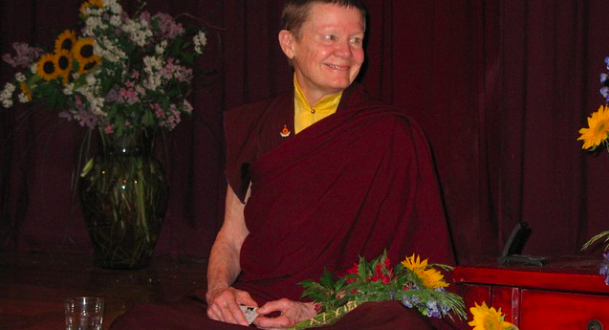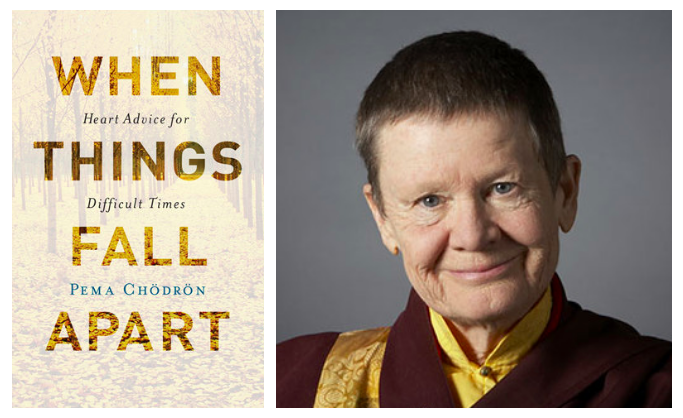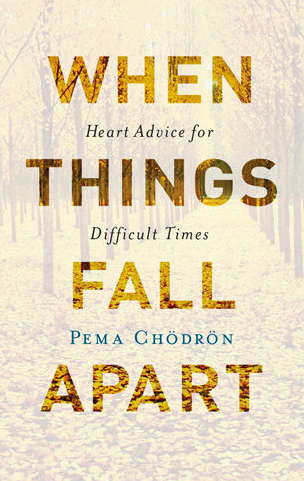“Each day, we’re given many opportunities to open up or shutdown,” writes the American Buddhist nun Pema Chödrön in her book, When Things Fall Apart: Heart Advice for Difficult Times (1997). “The most precious opportunity presents itself when we come to a place where we think we can’t handle whatever is happening. It’s too much. It’s gone too far. We feel bad about ourselves. There’s no way we can manipulate the situation to make ourselves come out looking good. No matter how hard we try, it just won’t work. Basically, life has just nailed you.”
Surely we have all felt “nailed by life” before. We expend precious energy charting our own course, creating an identity tethered to whatever fuels our ego, only to find ourselves in a situation where things fall apart – where the vicissitudes of life shatter the illusion that we are in control, stripping us of our polished self-image and propelling us into a state of chaos, uncertainty, doubt and despair.
Chödrön writes:
“…disappointment, embarrassment, and all these places where we just cannot feel good are a sort of death. We’ve just lost our ground completely; we are unable to hold it together and feel that we’re on top of things. Rather than realizing that it takes death for there to be birth, we just fight against the fear of death.”
It is precisely these moments, however – “when the bottom falls out and we can’t find anything to grasp” – that provide us with incredible opportunities for growth and gain, if only we learn to embrace the fallen apartness, rather than resist it. As Chödrön writes:
“To be fully alive, fully human, and completely awake is to be continually thrown out of the nest. To live fully is to be always in no-man’s-land, to experience each moment as completely new and fresh. To live is to be willing to die over and over again. From the awakened point of view, that’s life. Death is wanting to hold on to what you have and to have every experience confirm you and congratulate you and make you feel completely together. So even though we say the yama mara is fear of death, it’s actually fear of life.”
Below are a few examples of how we can reframe our fallen apartness as precious opportunities.
When things fall apart…we have the opportunity to heal:
“Things falling apart is a kind of testing and also a kind of healing. We think that the point is to pass the test or to overcome the problem, but the truth is that things don’t really get solved. They come together and they fall apart. Then they come together again and fall apart again. It’s just like that. The healing comes from letting there be room for all of this to happen: room for grief, for relief, for misery, for joy.”
When things fall apart…we have the opportunity to practice acceptance:
“The essence of life is that it’s challenging. Sometimes it is sweet, and sometimes it is bitter. Sometimes your body tenses, and sometimes it relaxes or opens. Sometimes you have a headache, and sometimes you feel 100 percent healthy. From an awakened perspective, trying to tie up all the loose ends and finally get it together is death, because it involves rejecting a lot of your basic experience. There is something aggressive about this approach to life, trying to flatten out all the rough spots and imperfections into a nice smooth ride.”
When things fall apart…we have the opportunity to expand our understanding and become open to more possibilities:
“Life is a good teacher and a good friend. Things are always in transition, if we could only realize it. Nothing ever sums itself up in the way that we like to dream about. The off-center, in-between state is an ideal situation, a situation in which we don’t get caught and we can open our hearts and minds beyond limit. It’s a very tender, nonaggressive, open-ended state of affairs.”
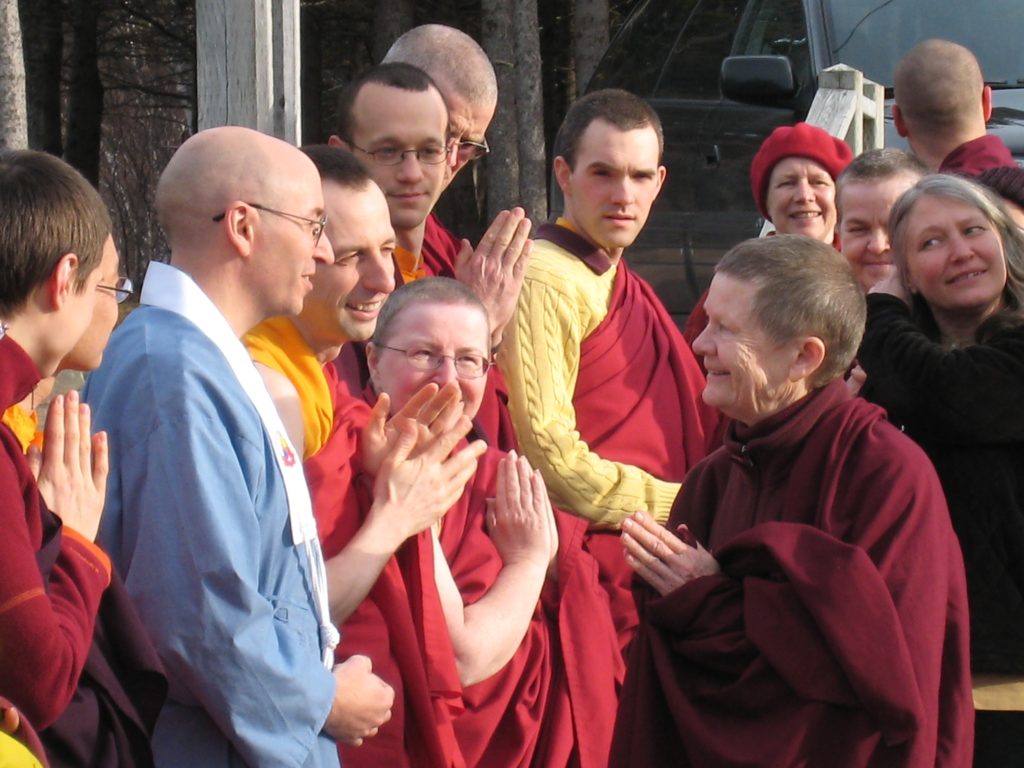
When things fall apart…we have the opportunity to embark on a spiritual journey:
“To stay with that shakiness – to stay with a broken heart,with a rumbling stomach, with the feeling of hopelessness and wanting to get revenge – that is the path of true awakening. Sticking with that uncertainty, getting the knack of relaxing in the midst of chaos, learning not to panic –this is the spiritual path. Getting the knack of catching ourselves, of gently and compassionately catching ourselves, is the path of the warrior. We catch ourselves one zillion times as once again, whether we like it or not, we harden into resentment, bitterness, righteous indignation – harden in any way, even into a sense of relief, a sense of inspiration.”
When things fall apart…we have the opportunity to see things in a new way, with greater clarity:
“When things fall apart and we’re on the verge of we know not what, the test for each of us is to stay on that brink and not concretize. The spiritual journey is not about heaven and finally getting to a place that’s really swell. In fact, that way of looking at things is what keeps us miserable. Thinking that we can find some lasting pleasure and avoid pain is what in Buddhism is called samsara, a hopeless cycle that goes round and round endlessly and causes us to suffer greatly.
The very first noble truth of the Buddha points out that suffering is inevitable for human beings as long as we believe that things last – that they don’t disintegrate, that they can be counted on to satisfy our hunger for security. From this point of view, the only time we ever know what’s really going on is when the rug’s been pulled out and we can’t find anywhere to land. We use these situations either to wake ourselves up or to put ourselves to sleep. Right now – in the very instant of groundlessness – is the seed of taking care of those who need our care and of discovering our goodness.”
When things fall apart…we have the opportunity to challenge faulty assumptions and patterns of thinking:
“To think that we can finally get it all together is unrealistic. To seek for some lasting security is futile. To undo our very ancient and very stuck habitual patterns of mind requires that we begin to turnaround some of our most basic assumptions. Believing in a solid, separate self, continuing to seek pleasure and avoid pain, thinking that someone ‘out there’ is to blame for our pain – one has to get totally fed up with these ways of thinking. One has to give up hope that this way of thinking will bring us satisfaction. Suffering begins to dissolve when we can question the belief or the hope that there’s anywhere to hide.”
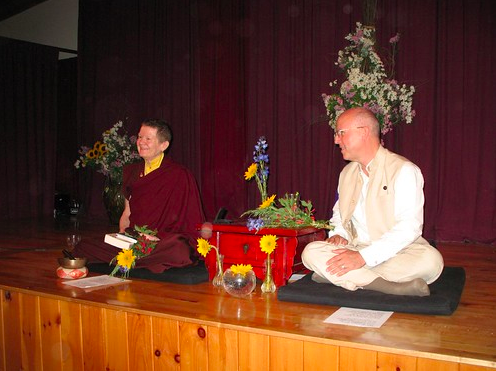
When things fall apart…we have the opportunity to learn more about ourselves:
“Generally speaking, we regard discomfort in any form as bad news. But for practitioners or spiritual warriors – people who have a certain hunger to know what is true – feelings like disappointment, embarrassment, irritation, resentment, anger, jealousy, and fear, instead of being bad news, are actually very clear moments that teach us where it is that we’re holding back. They teach us to perk up and lean in when we feel we’d rather collapse and back away. They’re like messengers that show us, with terrifying clarity, exactly where we’re stuck. This very moment is the perfect teacher, and, lucky for us, it’s with us wherever we are.”
When things fall apart…we have the opportunity to face our fear and trembling head on:
“Reaching our limit is not some kind of punishment. It’s actually a sign of health that, when we meet the place where we are about to die, we feel fear and trembling. A further sign of health is that we don’t become undone by fear and trembling, but we take it as a message that it’s time to stop struggling and look directly at what’s threatening us. Things like disappointment and anxiety are messengers telling us that we’re about to go into unknown territory.”
When things fall apart…we have the opportunity to practice self-compassion:
“The most difficult times for many of us are the ones we give ourselves. Yet it’s never too late or too early to practice loving-kindness. It’s as if we had a terminal disease but might live for quite a while. Not knowing how much time we have left, we might begin to think it was important to make friends with ourselves and others in the remaining hours, months, or years.
It is said that we can’t attain enlightenment, let alone feel contentment and joy, without seeing who we are and what we do, without seeing our patterns and our habits. This is called maitri – developing loving-kindness and an unconditional friendship with ourselves.”

When things fall apart…we have the opportunity to turn our ‘obstacles’ into ‘flowers’:
“…what we habitually regard as obstacles are not really our enemies, but rather our friends. What we call obstacles are really the way the world and our entire experience teach us where we’re stuck. What may appear to be an arrow or a sword we an actually experience as a flower. Whether we experience what happens to us as obstacle and enemy or as teacher and friend depends entirely on our perception of reality. It depends on our relationship with ourselves.”
When things fall apart…we have the opportunity to learn what we need to learn:
“Perhaps there is no solid obstacle except our own need to protect ourselves from being touched. Maybe the only enemy is that we don’t like the way reality is now and therefore wish it would go away fast. But what we find as practitioners is that nothing ever goes away until it has taught us what we need to know.
If we run a hundred miles an hour to the other end of the continent in order to get away from the obstacle, we find the very same problem waiting for us when we arrive. It just keeps returning with new names, forms, and manifestations until we learn whatever it has to teach us about where we are separating ourselves from reality, how we are pulling back instead of opening up, closing down instead of allowing ourselves to experience fully whatever we encounter, without hesitating or retreating into ourselves.”
Ultimately, when things fall apart…we have the opportunity to make a choice:
“The next time there’s no ground to stand on, don’t consider it an obstacle. Consider it a remarkable stroke of luck. We have no ground to stand on, and at the same time it could soften us and inspire us. Finally, after all these years, we could truly grow up. As Trungpa Rinpoche once said, the best mantra is ‘OM – grow up – swaha.’
We are given changes all the time. We can either cling to security, or we can let ourselves feel exposed, as if we had just been born, as if we had just popped out in the brightness of life and were completely naked.
Maybe that sounds too uncomfortable or frightening, but on the other hand, it’s our chance to realize that this mundane world is all there is, and we could see it with new eyes and at long last wake up from our ancient sleep of preconceptions.”
When Things Fall Apart is a comforting, reassuring read in its entirety for those experiencing a sense of groundlessness or those whose lives have felt overturned.
Packed full of wisdom and practical tools for understanding and navigating our inner world, it encourages us to adopt a new perspective on challenging and difficult times.
Similar posts:
- Worry, Not: Søren Kierkegaard on What We Can Learn from the Birds of the Air and Lilies of the Field
- Flannery O’Connor on Wrestling with Ambition and Humility
- Claiming Responsibility for Our Lives: Thomas Merton on Discovering Meaning and Purpose Within
- Gisele Bündchen on Self-Awareness, Challenging Your Thoughts and Paying Attention to Your Inner Voice
- Think Carefully: Marcus Aurelius on How to Control the Mind
- The Dalai Lama and Archbishop Desmond Tutu on the Four Qualities of the Mind that Lead to Joyful Living
- Saint Augustine on the Happy Life and Finding Joy
- Anne Lamott on Joy, Contentment and the Value We Have Within

